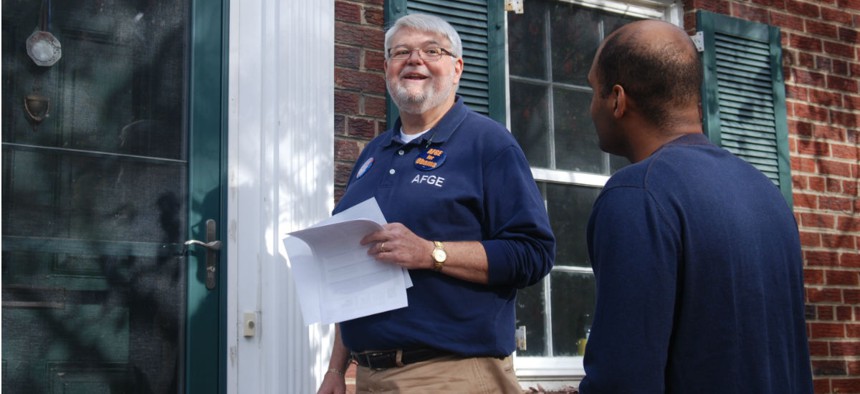
The American Federation of Government Employees campaigns for Barack Obama in 2012. Flickr user AFGE
Congress Looks to Crack Down on Feds Taking Time Off to Campaign
House and Senate leaders ask agencies for data on employees taking leave for union activity.
Congressional oversight leaders want to rein in federal agencies allowing employees to take unpaid leave in order to campaign with their unions, sending requests for detailed information to agencies across government.
The data will “ensure federal agencies are granting leave without pay in a politically neutral manner,” said Rep. Trey Gowdy, R-S.C., and Sen. Ron Johnson, R-Wis., the chairmen of the House Oversight and Government Reform Committee and the Senate Homeland Security and Governmental Affairs Committee. The lawmakers made their inquiries to 10 agency leaders following findings by the U.S. Postal Service inspector general and the Office of Special Counsel that the mailing agency unlawfully pressured supervisors to approve unpaid leave for employees last year to campaign for political candidates endorsed by their unions.
The chairmen requested agencies’ agreements with labor groups on “union-official leave,” general policies on leave without pay and all communications related to employees taking time off for union activity. They also asked for data since 2008 on the number of employees who requested leave without pay, and particularly who took time off for union activity and to participate in political activity. Agencies will also provide information on the number of denials issued in response to the leave requests.
In July, the USPS IG found the agency spent $90,000 on overtime to cover for employees who took time off to campaign in advance of the 2016 election. Unionized postal workers are allowed to take unpaid leave to engage in official activities on behalf of their labor groups, the IG said, but the agency did not follow proper protocols to ensure it should have granted the time off. An investigation by OSC, which enforces the Hatch Act on behalf of the federal government, found the Postal Service engaged in “systemic violations” of the law that led to an “institutional bias” in favor of certain candidates.
Johnson’s committee held a hearing on the Postal Service’s violations, during which USPS management promised to change its leave without pay policies. Going forward, Postmaster General Megan Brennan vowed USPS will no longer consider political activity part of official union business when approving leave without pay. The agency will also instruct managers to take a “hands-off approach” to a union’s political activity, so as to not create “institutional biases for certain candidates.”
In the cases the IG examined, postal headquarters did not coordinate the leave requests with the proper staff to ensure that the employees taking off would not be disruptive to local operations. In fact, the IG found local supervisors had originally raised concerns about the operational impact of the employees’ leave, but they were ignored. In some cases, the employees’ supervisors declined the requests before higher-level managers overruled them.
At the July hearing, Johnson questioned the Postal Service’s decision not to fire anyone in response to the reports. In his letters to other agencies he said the hearing was intended, in part, to “educate other federal agencies on how to avoid similar Hatch Act violations.”
Johnson and Gowdy requested data from agencies on a state-by-state basis, if feasible. The postal IG found USPS employees disproportionately took time off—about 82 percent of the cumulative 2,776 days—in political battleground states in which NALC had issued endorsements.







